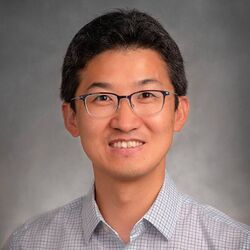2020 The Kovler Family Foundation-PCF Young Investigator Award

Interrupting Neuroendocrine Prostate Cancer Phenotypes by a Suppressor of Cytokine Signaling 2
Jung Wook Park, PhD
Duke University
Mentors: Jiaoti Huang, MD, PhD; Andrew Armstrong, MD
Description:
- Most prostate cancers are “adenocarcinomas,” meaning they originated in the mucus-producing cells of the prostate gland, and still retain many prostate cell features. However, highly aggressive, treatment-resistant variants such as neuroendocrine prostate cancer (NEPC) can arise in some patients.
- NEPC has lost prostate adenocarcinoma features and has developed features of neuroendocrine cells. New treatments are urgently needed for NEPC, which is a currently untreatable form of prostate cancer.
- Dr. Jung Wook Park is investigating the mechanisms that control the transition of adenocarcinoma into NEPC.
- In this project, Dr. Park will identify the proteins that act as master controllers of this transition, their specific roles, and the timing by which they act during prostate cancer progression.
- Whether any of the identified factors are promising therapeutic targets will also be investigated in preclinical models.
- If successful, this project will identify the master control factors that drive progression of prostate adenocarcinoma into NEPC and identify possible new therapeutic targets.
What this means to patients: Dr. Park will identify the essential genetic/molecular switches that control progression of prostate cancer into NEPC and enable NEPC to grow rapidly, which may represent new therapeutic targets for preventing or reversing NEPC development.

